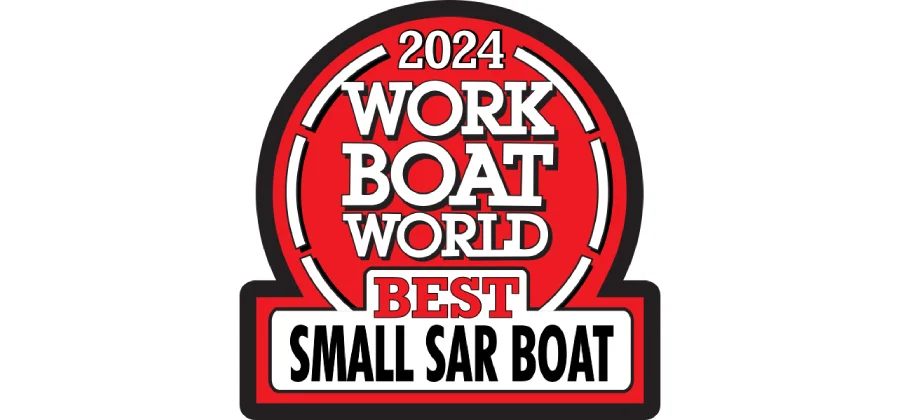AWARDS 2024 | Best Small SAR Boat – 'uya – Reyse Marine
Built by Reyse Marine in Canada, ’úya is a very smart and capable 13.4-metre pilot/rescue boat designed for Canada’s West Coast.
Its most obvious strength is its multi-role functionality, excelling in search and rescue, pilot transfer, firefighting, and oil spill response. The vessel features an open deck, transom, and side doors for safe water access, plus stretcher-supporting benches for medical emergencies.
She is fully equipped for low-visibility navigation, while twin waterjet engines deliver an impressive 41.5-knot top speed.
"’úya is a vessel in a class of its own – meticulously designed and engineered to meet and surpass the most stringent international safety standards," Clayton Reyse, President of Reyse Marine, told Baird Maritime.
"Built to operate reliably in the unforgiving environment of British Columbia’s Douglas Channel, it handles extreme wind, heavy winter seas, and debris-laden waters from the Kitimat River with remarkable ease and control."
One of the vessel’s notable safety features is its five integrated buoyancy compartments, which provide inherent flotation and ensure maximum stability under all conditions. Reyse explained that the vessel exceeds even the most demanding classification society requirements, positioning it beyond conventional categories of commercial or utility craft.
"Its hull design is another defining feature. At 15.42 feet (4.7 metres) wide, the extra-beam hull incorporates a deep 'V' with a 22-degree deadrise at the transom, enabling exceptional performance in rough water. Combined with a low centre of gravity and optimised weight distribution, the design delivers superior dynamic stability and seakeeping capabilities."
On its maiden voyage, ’úya encountered 2.5-metre waves and 50-knot winds.
"The vessel performed flawlessly – no hesitation, no compromise – affirming the confidence placed in its design and construction," said Reyse. "It is not simply built to survive harsh conditions; it is built to master them."
Reyse pointed out the combined experience of the project team, particularly the designer’s 25 years of specialising in vessels of this kind and Reyse Marine's more than 50 years of in-house boatbuilding experience, as key to the success of the project.
"It was truly a dream collaboration for any client seeking a proven, high-performance design and a seamless construction process. There were no major issues during the build. The fully custom project unfolded smoothly and efficiently, and we are all extremely proud of how successfully it was delivered."
Reyse said that the experience reaffirmed the value of working with a highly skilled, aligned team, and demonstrated that the company is fully prepared to meet the expectations of even the most discerning clients.
In Reyse's view, construction of vessels for the Canadian Coast Guard as well as small high-speed aluminium vessels in the year 2025 is being impacted by a shift towards cleaner, safer, and more Arctic-ready designs, and that regulatory pressure, both domestic and international, is accelerating change on a broad scale.
"Canada’s enforcement of the IMO Polar Code and the Arctic heavy fuel oil ban means even small craft must now be designed for extreme cold, high winds, floating debris, and ice conditions," Reyse told Baird Maritime. "Builders are responding with reinforced hulls, integrated buoyancy, deep-V designs for rough water, and cold-weather systems.
"At the same time, environmental regulations are tightening. With the Hong Kong Convention on Ship Recycling coming into force, vessels must now include certified hazardous materials inventories and be designed with end-of-life recyclability in mind, pushing cleaner aluminium construction and modular design."
Reyse said that digitisation is also transforming small vessel capability. Features like AI-assisted navigation, real-time diagnostics, and wearable crew safety tech are becoming standard, especially for SAR and patrol craft that operate under demanding conditions.
"Finally, while many small vessels are exempt from global emissions caps, Canada’s Carbon Intensity Indicator program signals a broader trend: future procurement will increasingly favour low-emission, fuel-efficient designs, even at smaller scales.
"Altogether, these trends reflect a new era of Canadian shipbuilding, one where aluminium vessels must be stronger, smarter, and more sustainable to meet both regulatory demands and real-world challenges at sea."
Reyse said the work on ’úya was an opportunity for Reyse Marine to showcase its skills to a larger market, and it has even generated some new leads and solidified contacts in the industry. As a result, the company has a number of projects out for tender at the moment and there is optimism about future prospects.
"The future of maritime emergency services lies in rapid response, clean energy, and digital precision," Reyse told Baird Maritime when asked about the state of the maritime emergency services industry. "Vessels will become smarter and more connected, with hybrid propulsion, AI navigation, and real-time crew safety systems.
"As climate extremes grow, demand will rise for rugged, high-speed craft built to perform in the toughest conditions – safely, efficiently, and sustainably."
As for the Canadian workboat industry, Reyse believes it is heading toward a new standard of performance, sustainability, and specialisation. Demand is rising for low-emission, multi-role vessels built for harsh climates, remote operations, and regulatory compliance.
"Over the next few years, we’ll see a shift toward hybrid propulsion, modular aluminium construction, and digitally enabled systems – from smart diagnostics to enhanced crew safety tech.
"Builders who combine rugged engineering with environmental responsibility will lead the way. We plan to be one of them!"
For a list of the 2024 "Best Of" award winners, please click here.




